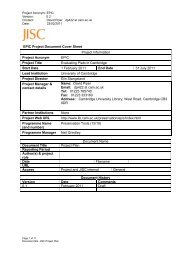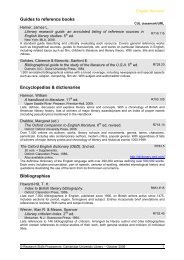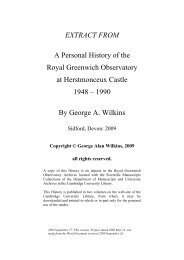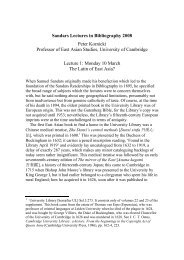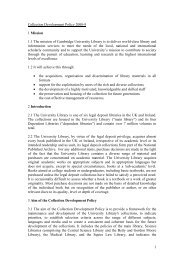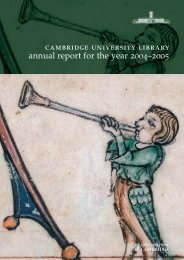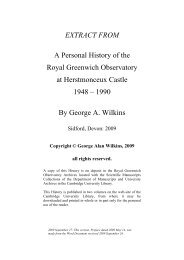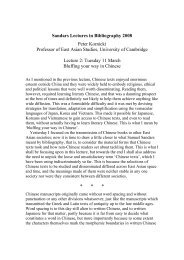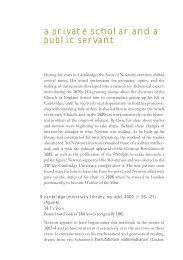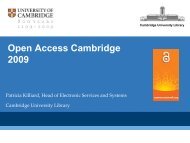2002-2003 [PDF] - Cambridge University Library - University of ...
2002-2003 [PDF] - Cambridge University Library - University of ...
2002-2003 [PDF] - Cambridge University Library - University of ...
Create successful ePaper yourself
Turn your PDF publications into a flip-book with our unique Google optimized e-Paper software.
6<br />
At a local level, pressure from academic staff,<br />
particularly in the biological sciences, led to the <strong>Library</strong><br />
agreeing to subscribe to Elsevier’s ScienceDirect service<br />
from <strong>2003</strong>. The <strong>University</strong>’s resistance over the last<br />
three years led to an improved <strong>of</strong>fer from the publisher,<br />
and the campaign has helped to bring to the attention<br />
<strong>of</strong> academic staff the problems <strong>of</strong> the continuing<br />
exorbitant rises in the price <strong>of</strong> STM journals from<br />
certain publishers, particularly at a time when university<br />
(and, therefore university library) budgets are, at best,<br />
receiving level funding.<br />
The Elsevier agreement is predicated on a limitation<br />
to the number <strong>of</strong> print subscriptions cancelled within the<br />
<strong>University</strong>, and so the General Board reminded<br />
departments <strong>of</strong> the requirement that cancellations may<br />
not be made without its approval. This also gave added<br />
impetus to the moves that have been under way for<br />
some time to put the <strong>University</strong>’s subscriptions to STM<br />
journals on a more co-ordinated footing. The Council <strong>of</strong><br />
the School <strong>of</strong> Biological Sciences and the <strong>University</strong><br />
<strong>Library</strong> agreed to pool their budgets for journals with<br />
effect from the <strong>2003</strong>-4 academic year and to have the<br />
expenditure managed on a shared basis by a Steering<br />
Group representative <strong>of</strong> the relevant academic<br />
departments and the <strong>University</strong> <strong>Library</strong>. In order to<br />
promote this arrangement and provide immediate access<br />
to a range <strong>of</strong> titles in the biological sciences, the<br />
<strong>University</strong> <strong>Library</strong> agreed to meet the cost <strong>of</strong> both<br />
ScienceDirect and electronic access to all Cell titles for<br />
<strong>2003</strong>. It was hoped that this arrangement would be <strong>of</strong><br />
interest to other departments (many <strong>of</strong> which are<br />
reporting problems in maintaining their range <strong>of</strong> journal<br />
subscriptions) but, so far, only the Department <strong>of</strong><br />
Chemistry has indicated that it wishes to participate<br />
fully. For it to be a complete success, full commitment<br />
from more departments is needed, as the cost <strong>of</strong> major<br />
services such as ScienceDirect, after the end <strong>of</strong> the<br />
current arrangement in 2005, will have to be met from<br />
rationalisation <strong>of</strong> (mainly duplicate) print subscriptions,<br />
releasing funds to be committed by the Steering Group.<br />
Whilst users have embraced the world <strong>of</strong> e-access<br />
with enthusiasm, there has been less progress in<br />
persuading academic staff – as the authors <strong>of</strong> papers or<br />
editors <strong>of</strong> journals – to adopt some <strong>of</strong> the alternative<br />
publishing strategies advocated by the <strong>University</strong><br />
<strong>Library</strong> as part <strong>of</strong> a national (with CURL) and<br />
international (with SPARC, LIBER, etc.) campaign to<br />
counteract the dominance <strong>of</strong> certain commercial interests<br />
in the scientific publishing world and promote the<br />
concept <strong>of</strong> open access. In this context the<br />
DSpace@<strong>Cambridge</strong> project could play a valuable part in<br />
providing academic staff with an institutionally-managed<br />
facility for self-archiving their scholarly communications.<br />
The advocacy for such an approach may be helped by<br />
initiatives such as BioMed Central (where institutions<br />
pay for their academics’ papers to be published and then<br />
have free access to all the papers ‘published’ by BioMed<br />
Central). During the year, JISC (the Joint Information<br />
Systems Committee <strong>of</strong> the higher education funding<br />
councils) announced a deal whereby the costs <strong>of</strong> BioMed<br />
Central subscriptions for all higher education institutions<br />
would be met centrally for eighteen months, and the<br />
<strong>University</strong> <strong>Library</strong> immediately made this service<br />
available to the <strong>University</strong> community.<br />
Darwin Correspondence Project<br />
The Darwin Correspondence project has been based<br />
in the <strong>University</strong> <strong>Library</strong> since its inception in 1974.<br />
It exists to publish the definitive edition <strong>of</strong> letters to<br />
and from Charles Darwin; when complete the series<br />
will comprise approximately 30 volumes. In<br />
November <strong>2002</strong> the Project was awarded the<br />
Queen’s Anniversary Prize for Higher and Further<br />
Education in recognition <strong>of</strong> the outstanding<br />
contribution that the Project has made to the<br />
intellectual, economic, cultural and social life <strong>of</strong> the<br />
nation, and in February <strong>2003</strong> the Vice-Chancellor and<br />
the project team received the award at Buckingham<br />
Palace from Her Majesty The Queen.<br />
The Vice-Chancellor<br />
receiving the<br />
Queen’s<br />
Anniversary Prize<br />
for Higher and<br />
Further Education<br />
from Her Majesty<br />
The Queen at<br />
Buckingham Palace<br />
on behalf <strong>of</strong> the<br />
Darwin<br />
Correspondence<br />
Project. On his left<br />
is Pr<strong>of</strong>essor Duncan<br />
Porter, the director<br />
<strong>of</strong> the project.<br />
Paul Mellor Photography


![2002-2003 [PDF] - Cambridge University Library - University of ...](https://img.yumpu.com/33538497/7/500x640/2002-2003-pdf-cambridge-university-library-university-of-.jpg)
